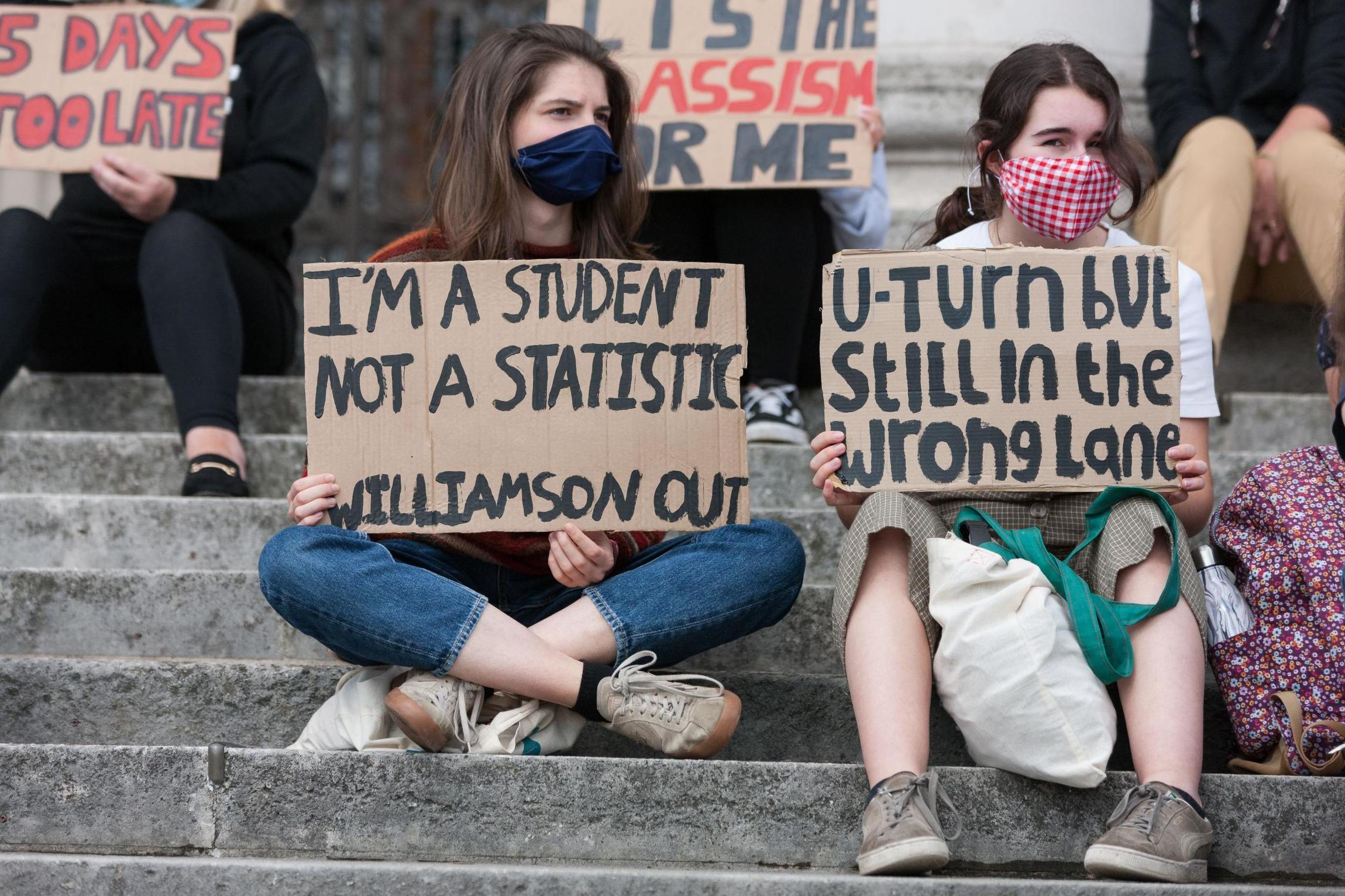The Independent's journalism is supported by our readers. When you purchase through links on our site, we may earn commission.
‘Ridiculous’, ‘unfair’ and ‘an absolute shambles’: GCSE students await their results following Ofqual U-turn
Following the government announcement that GCSE results will now be based on teacher predictions, 16-year-old Qais Hussain asks students if this new system is likely to be any fairer


This year has been an incredibly turbulent one for most – but particularly for the class of 2020. First came Covid-19, then came the closure of schools on the 18 March and eventually, the pandemic resulted in the cancellation of all examinations, including A-Levels and GCSEs, for the first time in history.
Following exam cancellations, the UK government adopted an algorithmic system to grade over 800,000 students who were supposed to sit their exams this Summer. Last week, 18-year-olds across England, Wales and Northern Ireland woke up to find that almost 40 per cent of them had their grades marked down in the moderation process.
Private school pupils appeared to benefit from the algorithm, with 49 per cent of entries by students at independent schools receiving an A grade or above, compared with just 22 per cent of students at comprehensive schools. Shadow education secretary Kate Green MP described it as a “huge injustice that pupils will see their results downgraded just because of their postcode.” Her comments echoed the thoughts of many when she described the government’s approach to exams as “chaotic”.
There was a public backlash from students as they were concerned about the vast disparities caused by the grading system. The Welsh Government announced a U-turn on 17 August, after mounting pressure following the news that 42 per cent of A-Level results in the country had been downgraded by the algorithm. They announced that results would instead be determined by teacher estimations.
Kirsty Williams, Wales’s education minister, said that “given decisions elsewhere, the balance of fairness now lies with awarding Centre Assessment grades (CAGs) to students”. Wales followed on from similar announcements from Scotland and Northern Ireland.
England, meanwhile, was the last to respond. Despite Ofqual and Gavin Williamson previously refusing to give interviews and Conservative MP, Jason McCartney, saying “Coronavirus is responsible” for the exam chaos, hours after the devolved nations announced their changes to grading plans, Roger Taylor, chair of Ofqual, finally announced that “CAGs should be awarded for A-Levels and GCSEs,” in England acknowledging the difficulty young people face” during this unprecedented time.
Williamson claimed that England’s U-turn on algorithm grades came after he could no longer “tolerate unfairness” or “turn a blind eye” to an inaccurate and biased system, but he had ample time to act, was given a heads-up after it appeared that less-privileged students in Scotland were downgraded by a greater margin than their better off peers when they received their results the week before, and yet he continued to drag his feet.
So Ofqual has said “students [can] be awarded their centre assessment for this summer - that is, the grade their school or college estimated was the grade they would most likely have achieved in their exam - or the moderated grade, whichever is higher.”
Teachers know our abilities so much more than the government
On Thursday 20 August, students in England, Wales and Northern Ireland will receive their GCSE results. For most, it is an enormous relief that the Government abandoned the algorithmic system, but many remain confused and unconvinced about the accuracy of the process.
Heather*, 16, who attends a girls’ school in Manchester, is relieved following the latest announcement, telling The Independent: “I was feeling extremely nervous at first, but when I found out that they have changed the way we get our grades, I didn’t feel as scared because the teachers know our abilities so much more than the government!”
But she remains frustrated that the government didn’t do more to prevent the situation, saying that her and her year 11 contemporaries have been under great stress as a result of all the changes. “It has been ridiculous and extremely unfair on us,” she says.
Before the exams were cancelled, Heather was aiming for all six’s, but now she says she will be happy with 4’s or 5’s. “I just want the grades to pass,” she says, “especially considering I haven’t sat the exam”.
While the news is a relief to some, it doesn’t solve the problem. Teacher’s grades, of course, do no account for biases either. BAME students and those from working class families have been shown to be disproportionately affected by the prediction of grades – something that still hasn’t been addressed by the Government.
Sarah, 16, from Derby, explains that while “it could be a lot fairer and give people higher results which they may deserve,” she is “not feeling great” about her results – largely because she thinks they won’t necessarily be a huge amount fairer.
“I won't do as well as if I had sat my GCSEs, and that is what really stresses me out,” she says. “I had many different versions of teacher predictions as my school gave everyone a lower predicted grade then what they deserved, and this worries me.”
Despite being a self-confessed Conservative supporter, Tom, 16, from West Yorkshire, thinks that the government has “made an absolute shamble of the grading system”. He believes the change to the grading process should have happened “as soon as the Scottish results came out. Then they should have publicly acknowledged the error and done what they have done today.
The general feeling among students is one of distrust and frustration and – having seen their elders collect their A-Level results last week – one of apprehension for their own fate on Thursday.
Grace, 18, from South Yorkshire received her A-Level results last week. She believes the rejection of the algorithm was necessary as “the only way that students across the nation had a chance to feel rewarded.” The whole experience has left a sour taste in her mouth for her final year at school.
“I feel as though this year's finale to high school education has been stunted and scarred. The problem could have been prevented from the day the government announced exams wouldn’t be happening. Ofqual had a simple task of giving deserved results out, but instead turned it into a purposeless fiasco.”

But despite everything, Grace remains positive. “My grades are lower than my potential, but with a strong personal statement and CV I’m positive they won’t hold me down. I’m planning to take a year out before going to University next September. I have my fingers crossed for the upcoming GCSE results day and hope that it is not so unavailing as A-Levels.”
Margot, 18, from West Yorkshire, was predicted AAB but received ABC on results day. She tells The Independent that while she doesn’t feel these grades are “a reflection of me as an individual student,” the CAGs announcement could help turn that around. “I hope to be able to secure my first university choice, but nothing is certain yet, so I am still very concerned about my future”
I hope to be able to secure my first university choice, but nothing is certain yet. I am still very concerned about my future
There have been huge concerns that universities have been allocating hundreds of thousands of places based on standardised grades. Students who are unable to get into their preferred choice have been accepting alternatives via the clearing service. The government says they will be able to swap back now, but there's no guarantee the universities will take them.
For many students, it might be too late, as many places have already been filled. Students who have lost their places to the algorithm now face a terrible choice: accept the hand they've been dealt by a flawed and apparently discriminatory computer system, attend a worse university or give up on attaining a degree altogether; or appeal against the downgrade and potentially wait a year to get onto their course which may already be fully booked.
Whether they go to university or not, after all this, what awaits the class of 2020 is the worst recession in UK history, an estimated two million unemployed and uncertainty like never before. Hardly the picture most would hope for from their last days at school. For GCSE students, at least we have a few more years at school to get a second chance.
*names have been changed
Join our commenting forum
Join thought-provoking conversations, follow other Independent readers and see their replies
Comments
Bookmark popover
Removed from bookmarks